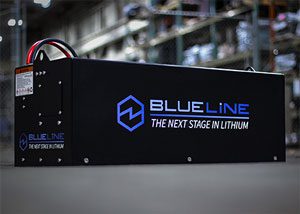
Blue Line Battery produces advanced Lithium-ion power systems.
Wisconsin is a trailblazer in innovative battery technology, harnessing the promise of startups to leverage a place in the international market and revolutionize the way we power vehicles, electronics, and more.
Few states have shown as much promise for the future of batteries, specifically in lithium-ion devices, as Wisconsin. As products and vehicles increasingly turn to electric power, Wisconsin is home to several companies researching and manufacturing the latest in lithium-ion technology.

Founder Carol Hirschmugl presents COnovate’s COphite™ material.
Milwaukee-based COnovate Inc. is one of those companies. The company makes a new, carbon-based material for lithium-ion batteries. Compared to graphite, which has been used in such batteries for more than 40 years, Conovate’s COphite™ material offers faster charging, higher capacity, and more safety. The company is targeting its technology toward lithium-ion batteries in power tools, electric bikes and drones and hopes to eventually get the material in cars, as well.
Blue Line Battery Inc. is another part of Wisconsin’s battery-tech sector. The company manufactures lithium-ion batteries for forklifts. As opposed to lead-acid batteries, which are used in over 95% of forklifts in the U.S., lithium-ion batteries are very energy efficient. In fact, some industrial customers have saved between $1,500 and $3,500 a month by using Blue Line batteries. Seven years after forming as a company and three years after beginning to sell its products, Blue Line Battery reached profitability in 2022.
Madison-based Silatronix is another firm expanding Wisconsin’s leadership in battery technology. Its Silatronix® OS compounds, patented organosilicon electrolyte additives, improve the runtime of lithium-ion batteries. The company, founded in 2007 by UW-Madison chemistry professors Robert Hamers and Robert West, also does research and development for customers designing more effective batteries. Silatronix’s products are predominantly used in drones and airplanes but, like COnovate, it sees future potential in electric vehicles. With the industry primarily concentrated in Asia, Silatronix has focused much of its sales and marketing efforts on Japan, South Korea, and China, although the U.S. is progressing toward domestic production of lithium-ion batteries.
Key to Wisconsin’s industry leadership has been the support of WEDC and its Qualified New Business Venture (QNBV) Program, which helps early-stage companies obtain equity investment. COnovate, Blue Line Battery and Silatronix all used the program to gain a foothold as they grew.
QNBV gives eligible angel and venture fund investors a Wisconsin income tax credit equal to 25% of their investment. That credit helps young companies attract the investment they need to develop products, enter markets, and create jobs as they realize marketplace success.
Venture capital groups, cautious about Blue Line and hardware manufacturing startups in general, at first steered clear of the company, so Blue Line depended upon Wisconsin angel investors to stay afloat. The company has raised $5.7 million to date, with 98% from angel investors.
“We wouldn’t have made it to profitability without capital, and we wouldn’t have gotten capital if it wasn’t for QNBV,” said Phil Fonfara, president of Blue Line Battery. “If we didn’t have QNBV, we likely would not have received funding and our business would not exist. It’s that linear.”
